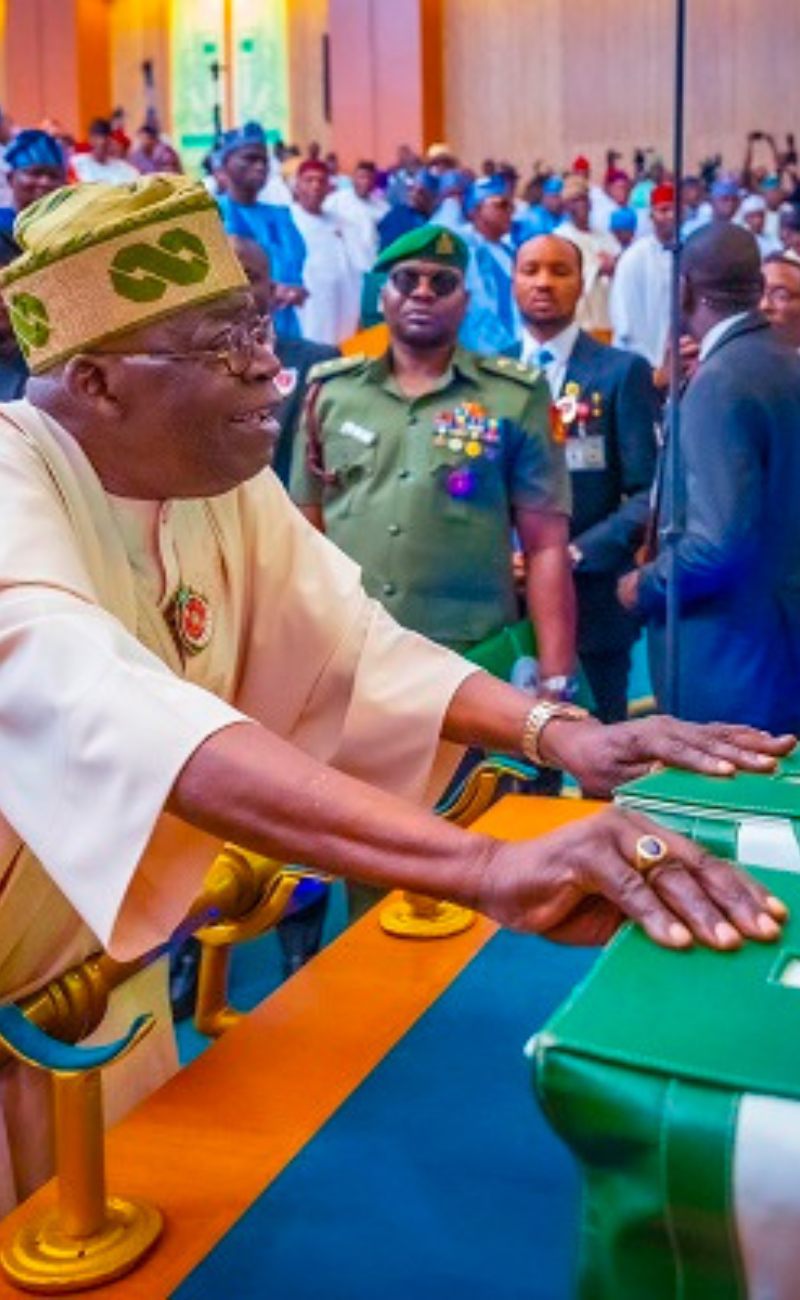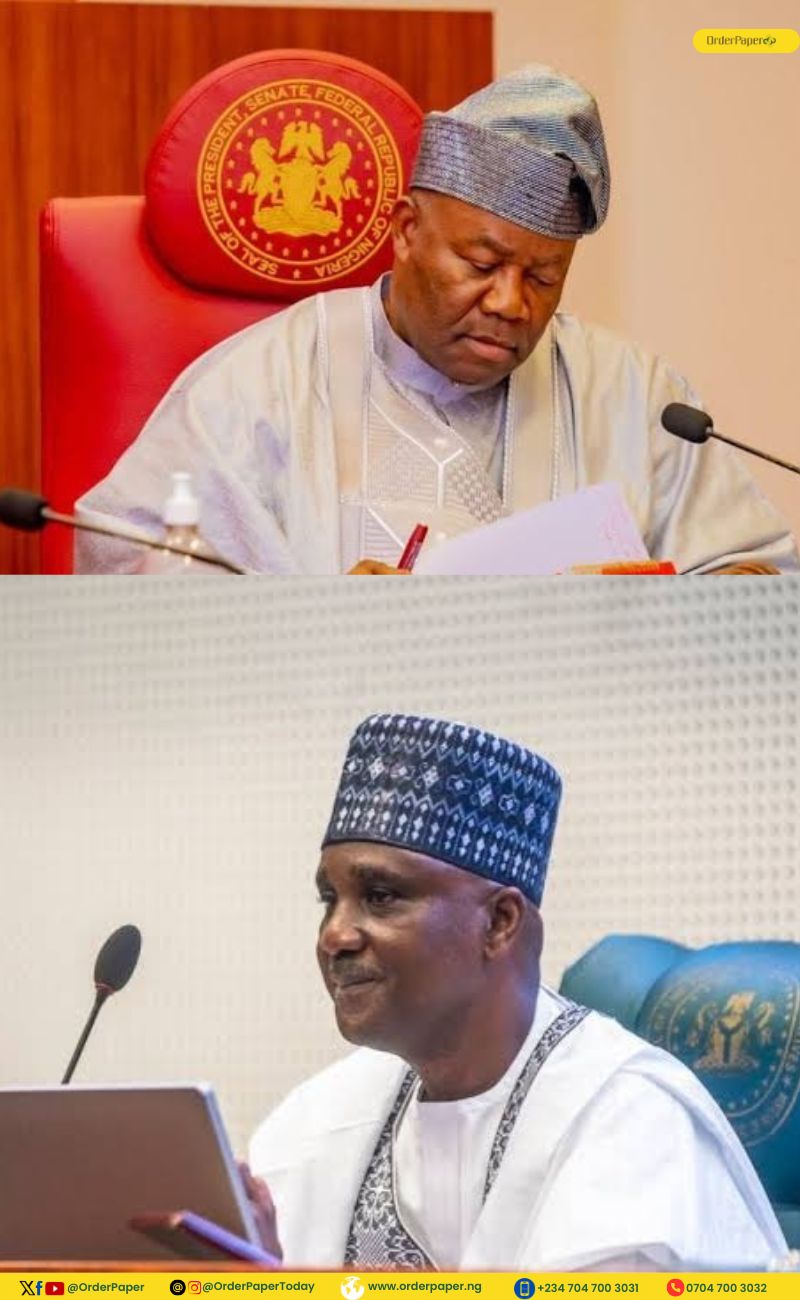Despite the recommendations of the Oronsaye report and the clamour for leaner and more efficient government parastatals, legislative contradictions continue to abound, with 1477 establishment bills sponsored before the National Assembly in the past five years.
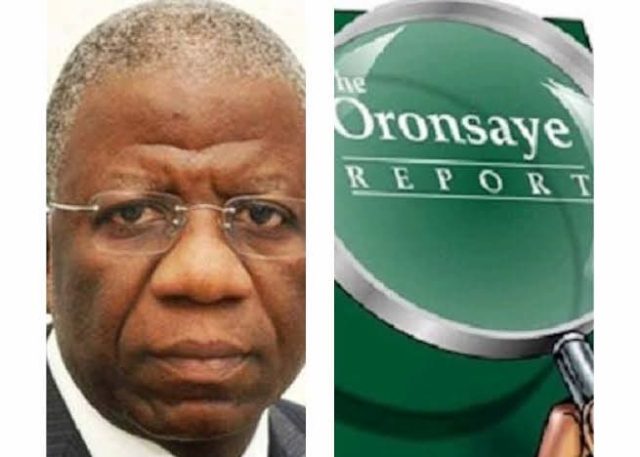
Over time, the Oronsaye Report has often been called a beacon of reform and a blueprint for streamlining bureaucracy and enhancing efficiency. Commissioned in 2011 by the Goodluck Jonathan administration, the report aimed to rationalise government agencies and reduce overlapping functions, ultimately cutting costs and improving service delivery.
While it would seem that over a decade later, the recommendations would continue to languish in the corridors of power, President Bola Ahmed Tinubu’s administration took up the recommendations on February 28, 2024.
But will this renewed call for the report’s implementation be overshadowed by the persistent churn of establishment bills sponsored before the floors of the National Assembly every other day at plenary?
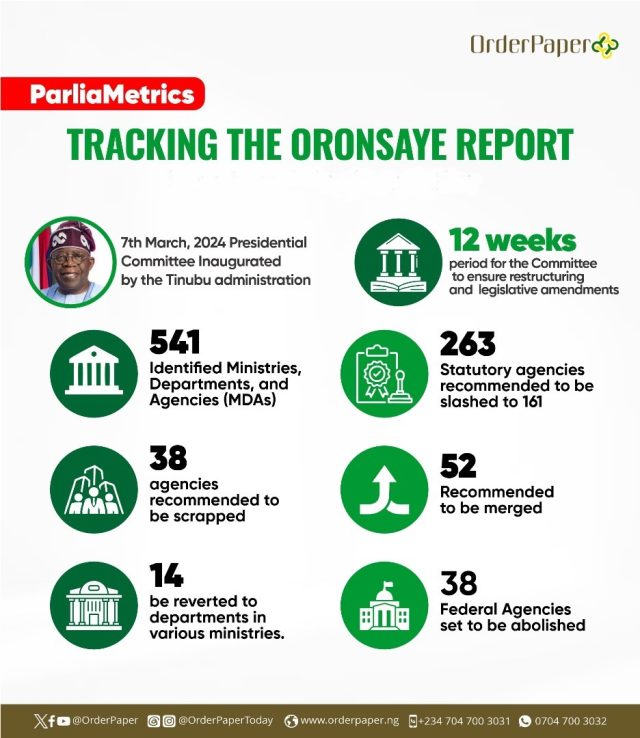
Inception and Implementation Strggules of the Report
Officially titled “Presidential Committee on the Rationalisation and Restructuring of Federal Government Parastatals, Commissions, and Agencies,” the Oronsaye Report, named after its chairman, Steve Oronsaye, a former Head of the Civil Service of the Federation, identified a plethora of redundant agencies and suggested merging or abolishing them to streamline government operations. Its comprehensive review spanned over hundreds of federal government agencies, highlighting Nigeria’s bloated bureaucracy and its drain on public resources.
A committee led by Mohammed Adoke, the former Attorney-General of the Federation, reviewed the Oronsaye Report in 2014 but rejected most of its recommendations. Even the accepted ones were not acted upon until the end of the Jonathan administration in 2015.
The Muhammadu Buhari administration initiated two committees in 2021 to implement the report. The first committee, headed by Bukar Aji, reviewed the Oronsaye Report and the government’s response. The other committee, led by Amal Pepple, aimed to assess agencies created between 2014 and 2021. Despite these efforts, it established a subsequent white paper committee led by Ebele Okeke in July 2022. However, the Buhari administration did not follow through with implementing the report.
Now, 12 years later, the Tinubu-led administration has taken up the report for implementation. On March 7, 2024, a Presidential Committee was inaugurated and given 12 weeks to ensure restructuring and legislative amendments.
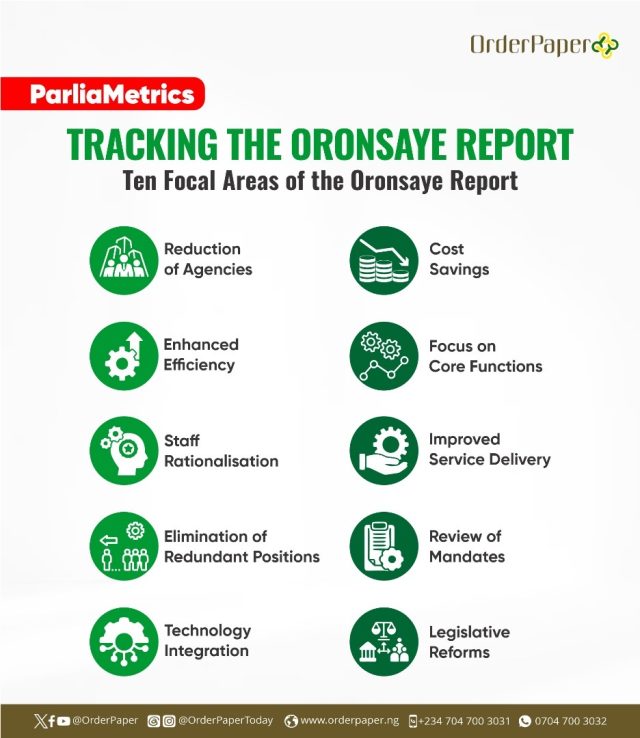
The Report and Legislative Contradictions
The continuous sponsorship of establishment bills by legislators on the floor of both Chambers of the National Assembly has been the bane of the Oronsaye report’s existence. These bills, in contrast, seek to create or sometimes duplicate an MDA and provide for its guiding principles of operations. Establishment bills also seek to create tertiary institutions and health centres.
Between the 9th Assembly and the current 10th Assembly, 1477 establishment bills have been brought before the floor of the red and Green chambers. While not all of these were passed, the volume, which is over three times the number of identified statutory and non-statutory MDAs
READ ALSO: Senate damns Oronsaye Report, set to establish University of Education
In the 9th Assembly, 721 and 376 bills were establishment bills sponsored by the House and Senate, respectively, in three years. In the first six months of the 10th Assembly, the House has 337 establishment bills, while the Senate has 43 thus far. A cursory look at the number of establishment bills sponsored thus far in the House indicates that the numbers will likely be higher at the end of its tenure than we had in the 9th House.
In categorising these establishment bills by sector, universities and colleges of education take the lead, while health establishment bills seeking to create health centres come in at a close third. The other establishment bills are spread across agriculture, ecology, security, ICT, finance, social welfare, etc.
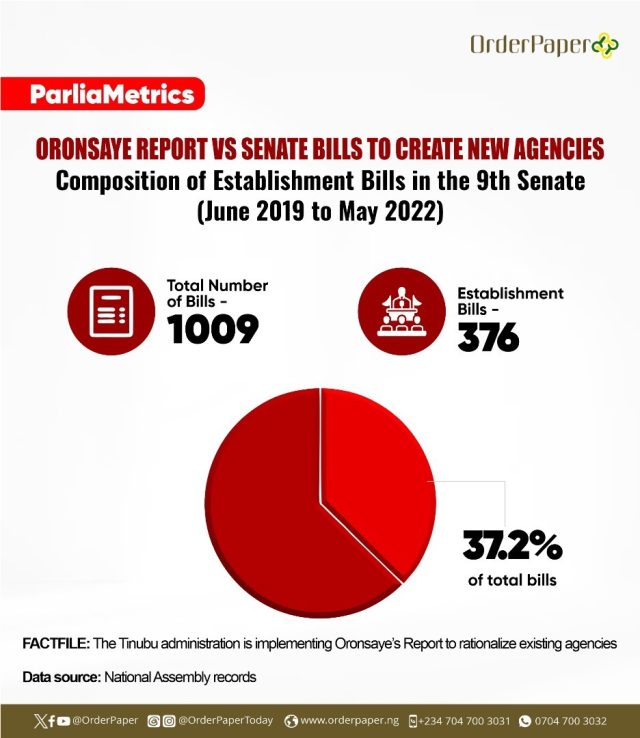
These contradictory actions by Legislators undermine the spirit of the Oronsaye Report and perpetuate the inefficiencies it sought to address. The continuous sponsorship of establishment bills reflects a disconnect between legislative actions and the broader goal of governance reform. While the National Assembly has the prerogative to propose bills, its failure to align legislative priorities with the imperative of efficiency perpetuates a cycle of bureaucratic expansion and inefficiency.
Not only have some of these bills sought to duplicate or increase the cost of governance, but some have been outright controversial. A controversial establishment bill that easily rings a bell is the National Commission for the Prohibition of Hate Speeches (Est. etc.) bill 2019, sponsored by Sen. Sabi Abdullahi (APC, Niger North). The bill, first introduced in the 8th Assembly but abandoned after intense pressure and criticisms, was reintroduced in the 9th Assembly. The bill, which sought to prescribe the death penalty for anyone found guilty of spreading a falsehood that leads to the death of another person, was also terminated at the first reading stage. This was after receiving a lot of criticism and agitation from various groups and stakeholders. Most of these groups clamoured for a review of the capital punishments prescribed in the bill or for the discountenance of the bill in its entirety. Similarly, the bill has been abandoned since 2019 at the first reading stage.
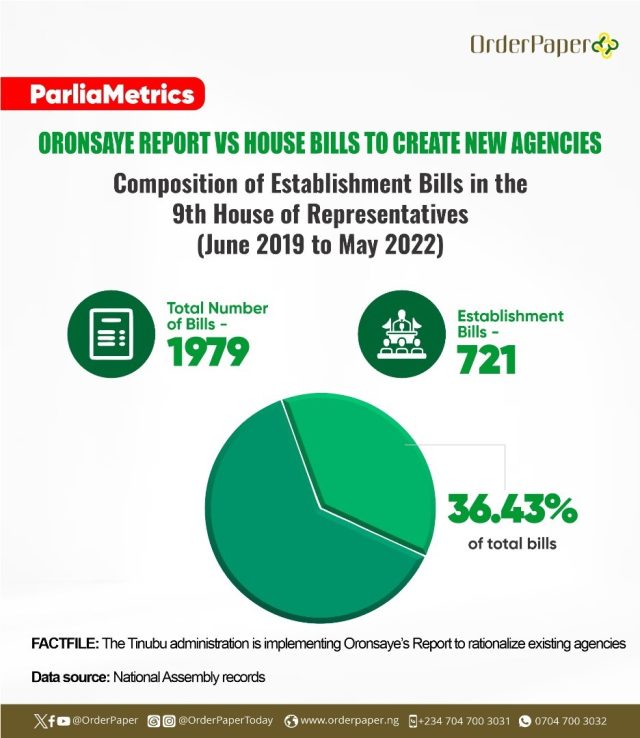
A Call to Action
Furthermore, civil society and citizens must hold their elected representatives accountable for their actions, demanding transparency and accountability in legislative processes.
Also, the persistence of establishment bills contradicts Nigeria’s fiscal imperative, especially in an era marked by economic uncertainty and dwindling resources. The Oronsaye Report, emphasising cost-saving measures, remains a potent tool for fiscal prudence and responsible governance. Ignoring its recommendations favouring bureaucratic expansion is a disservice to the Nigerian people and a betrayal of the trust bestowed upon elected representatives.
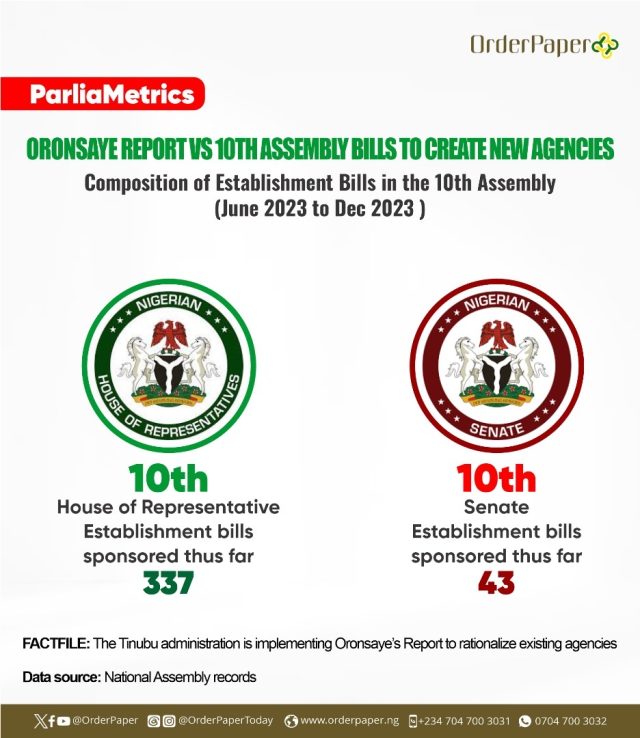
Hence, lawmakers must prioritise implementing the Oronsaye Report’s recommendations to break free from this cycle of passivity. This entails a concerted effort to review and enact legislation that aligns with the report’s goal of rationalising government agencies and promoting efficiency. It requires a shift in mindset from short-term political gains to long-term sustainable governance. To truly embrace the spirit of reform, Nigerian lawmakers must heed the report’s lessons and chart a course towards a leaner, more efficient government, starting from the legislature. Only then can Nigeria realise its full potential and deliver the dividends of democracy to its citizens.

